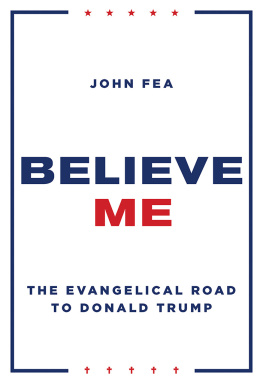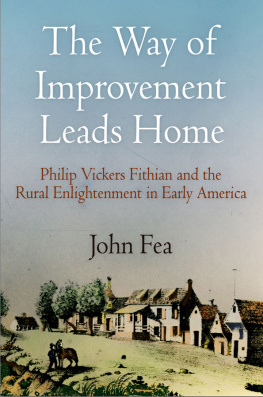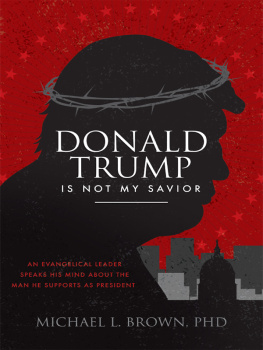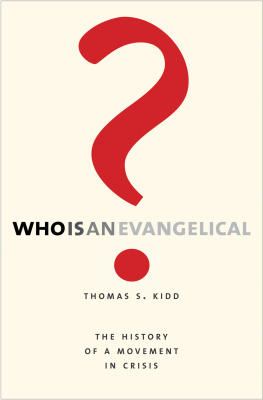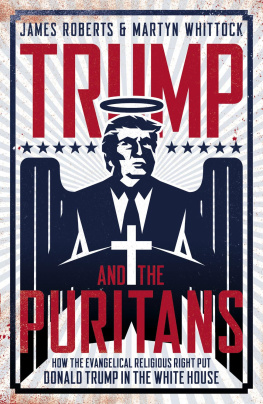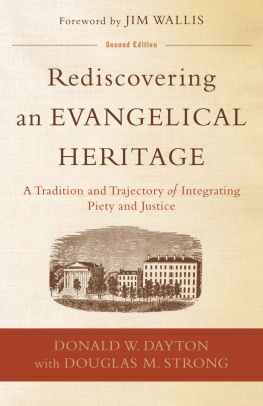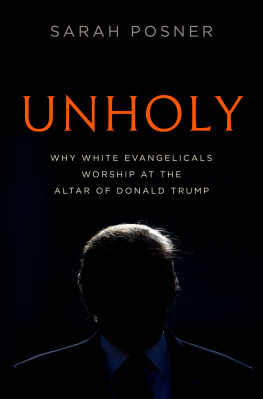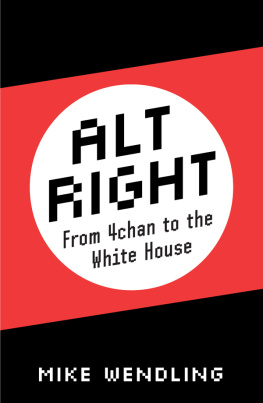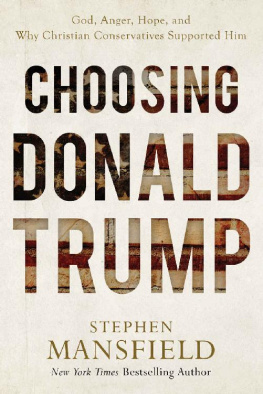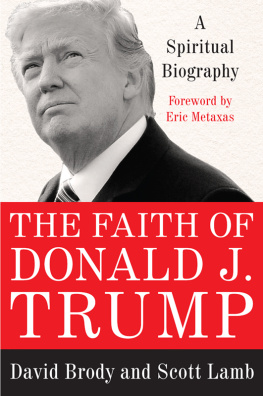BELIEVE
ME
The Evangelical Road
to Donald Trump
John Fea
WILLIAM B. EERDMANS PUBLISHING COMPANY
GRAND RAPIDS, MICHIGAN
Wm. B. Eerdmans Publishing Co.
2140 Oak Industrial Drive NE, Grand Rapids, Michigan 49505
www.eerdmans.com
2018 John Fea
All rights reserved
Published 2018
27 26 25 24 23 22 21 20 19 181 2 3 4 5 6 7 8 9 10
ISBN 978-0-8028-7641-6
eISBN 978-1-4674-5046-1
Library of Congress Cataloging-in-Publication Data
A catalog record for this book is available from the Library of Congress
To the 19 percent
CONTENTS
I want to thank the administration of Messiah College for the time and resources provided me to write and think about the connections between American history, religion and politics. The good folks at Eerdmans PublishingAnita Eerdmans, James Ernest, and especially David Bratthave been nothing but encouraging and helpful from the moment I first brought this project to them. My conversations with David have shaped this work more than he will ever know. A very big thank you goes to Devon Hearn, my research assistant. Devon has done the unheralded work of tracking down sources, requesting books through InterLibrary loan, and taking on tasks that have enabled me to write under a tight deadline. And she does it all with a smile on her face! Collin Gallagher, who graciously volunteered to help with this book, proved to be an excellent undergraduate researcher. Alanna Carnes, Robin Schwarzmann, and Kyra Yoder helped with the proofreading. I also want to thank Phillip Luke Sinitiere for taking time out of his Advent season to provide comments on several chapters, and Caroline Fea for offering comments on the introduction and the conclusion. As always, I could not have written this book without the loving support and regular encouragement of Joy, Allyson, and Caroline.
O n August 6, 2015, the night of the first Republican presidential primary debate, what would become one of the most extraordinary presidential campaigns in American history faced an unsurprising momentthat is, highly unusual in most of the industrialized world but unsurprising in Republican politics. After two hours of debate, a Facebook user named Chase A. Norton asked one of the last questions of the evening: I want to know if any [of the debaters] have received a word from God on what they should do and take care of first. Three of the candidates, Texas senator Ted Cruz, Wisconsin governor Scott Walker, and Florida senator Marco Rubio, jumped on what seemed like a golden opportunity to appeal to white evangelical voters. Cruz reminded the audience that God speaks to him through the Bible and told the story about his father giving his heart to Jesus. Walker said he was redeemed from his sins by the blood of Jesus Christ and would thus seek to do His will as president. Rubio talked about Gods blessing on the American people. The message to conservative evangelical voters was strong and clear: I am one of you!
New York real-estate tycoon and reality-television star Donald Trump, whose double-digit lead in the polls had secured him a spot at the center of the stage, was not asked to answer Nortons question. But after watching the other candidates efforts to claim the evangelical high ground, his campaign must have realized that, if he could not make a similar appeal to white evangelical voters, he would not be at center stage for very long. Trump would need to find his evangelical groove.
Coincidentally, I had spent the morning of that debate rereading University of Virginia sociologist James Davison Hunters manifesto To Change the World: The Irony, Tragedy, and Possibility of Christianity in America (2010). Hunter argues that evangelical Christian attempts to change the world through politicselecting the right candidates, who will then pass the right laws and approve the right justices for the Supreme Courthave largely failed. In grasping for political power, Hunter says, evangelicals have made it more difficult to spread the gospel, promote justice for the poor and oppressed, and pursue human flourishing in the places where God has called and placed them. In one of the more telling and prophetic passages of the book, he writes: The proclivity toward domination and toward the politicization of everything leads Christianity today to bizarre turns, turns that... transform much of the Christian public witness into the very opposite of the witness Christianity is supposed to offer. Christians were never meant to change this world; instead, they are called to honor the creator of all goodness, beauty, and truth, a manifestation of our loving obedience to God, and a fulfillment of Gods command to love our neighbor. Hunter urges evangelical Christians to stop fighting the culture wars and pursue a course of faithful presence in their local communities and neighborhoods.
I read Hunters book and watched the debate, not just as a historian interested in the relationship between religion and politics, but as a participant. I have long identified with the label evangelical: I attend an evangelical church, and I am a professor at a college with deep roots in the evangelical tradition. Of course, that deceptively simple label refers to a movement with a surprisingly diverse set of subcultures, and I have plenty of disagreements with those within those subcultures. But for all of the complexity behind the word evangelical, at its heart is a simple and compelling notion: evangel, or good news.
Over the course of the next several months Donald Trump made what seemed to be awkward attempts to win over white evangelicals. At times, his efforts to connect with and understand a religious culture he knew nothing about were comical. In a speech at Liberty University he referred to Saint Pauls Second Epistle to the Corinthians as Two Corinthians (Americans who study the Bible say Second Corinthians). In an interview in Ames, Iowa, he claimed that he never asks God for forgiveness, and he referred to Holy Communion as drinking my little wine and having my little cracker. (Trumps self-proclaimed knowledge of the meaning of the sacrament did not prevent him from nearly placing a few bucks in the communion plate during a worship service in Iowa.) He was apt to show up at campaign rallies clutching an old family Bible. When asked what his favorite Bible verse was, he said he liked an eye for an eye, a reference to the Old Testament punishment system set forth in Exodus 21:2225. (Trump was obviously not aware that Jesus himself, in Matthew 5:3839, had something to say about the Exodus passage: You have heard that it was said An eye for an eye, and a tooth for a tooth. But I tell you, do not resist an evil person. If anyone slaps you on the right cheek, turn to him the other cheek also.)
Beyond those bumbling attempts to use evangelical language, Trumps decidedly un-Christian behavior on the campaign trail seemed at first blush to reinforce the challenge he might face in wooing evangelicals. On more than one occasionduring his rants on topics ranging from Megyn Kellys debate questions to Carly Fiorinas and Heidi Cruzs physical appearanceTrump denigrated women. He used the televised debates to belittle his political opponents with junior-high nicknames, and he even bragged about the size of his genitals. He claimed that the father of one of his opponents was involved in the Kennedy assassination. He announced that another competitor had a pathological temper and was not a member of a real Christian denomination. He denigrated a war hero and former presidential candidate. After the release of a tape on which he talked about the ways he used his celebrity to sexually assault women, the 2016 GOP presidential nominee dismissed his language as mere locker-room talk. Within hours, multiple women came forward to confirm that what Trump bragged about to an entertainment reporter was more than just locker-room talk. It was quite real.

